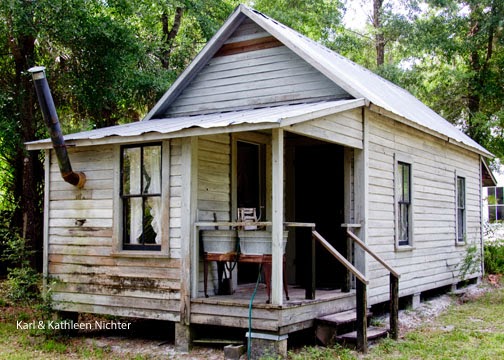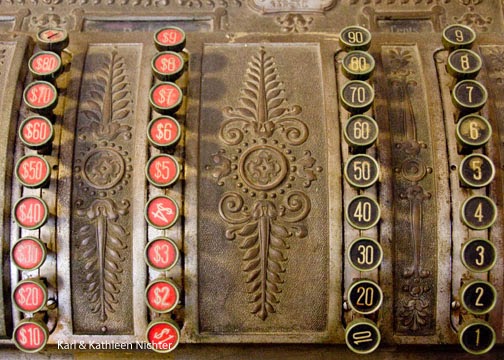Driving along State Road 40 on our way to Tomoka State Park I noticed a sign for Pioneer Settlement. I just saw the name, so looked it up later and found out that this "village" contains seventeen historical structures, many of which may have been destroyed if not relocated and restored. We both love history and particularly living history like this. On the way back, we found the turn and visited.
Pioneer Settlement is open Monday to Saturday 9 a.m. to 4 p.m., and admission for adults is $6, less for children. We walked around, talking to the interpreters who explained the buildings, and demonstrated various skilled crafts such as rug weaving and spinning. We toured the many buildings including a railroad depot, blacksmith shop, church, pottery shed, and the Barberville Central High School building. The high school, built in 1919, served as school until 1969. It now houses a museum with many displays.
This shotgun style house dates from the 1920s. The two laundry tubs on the porch remind us of a "simpler" time, though I find the thought of hand washing, rinsing, and hanging clothes on a line to dry less than simple.
I shot this looking into the school room replica. The blue behind the lamp is the shirt of the mannequin dressed like the school marm.
A close-up of an old cash register. H.L. Wynn's Commissary from the 1900s serves as the country store. Items made by the various craftspeople are sold here, with proceeds helping to support their programs.
We love traveling the smaller highways and back roads. Not only is the scenery more interesting than the Interstates, but we never know what we will discover.
Karl and Kathleen Nichter Photography
This blog began in 2009, about a year after we started our photography business. People attending our photo exhibits, or our hikes and workshops, asked for details on where we traveled for photography. As naturalists we usually kept a field journal, so we used that as a basis for Field Notes.
In Summer, 2014 we took a break from the blog because our business, and lives were changing. In January 2015 the blog restarted with an expanded theme. It now contains photography, notes, and articles from all of our travels and all of our photography, not just nature themed. The posts prior to 2014 have been archived.
For more information, please click on "About Us" below.
Thank you for visiting.



No comments:
Post a Comment